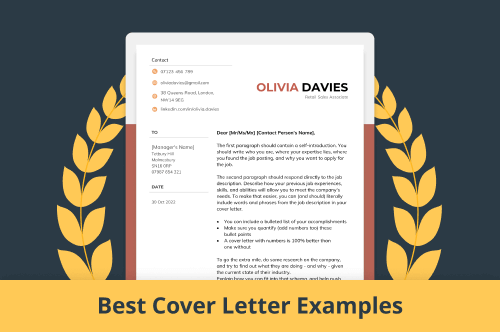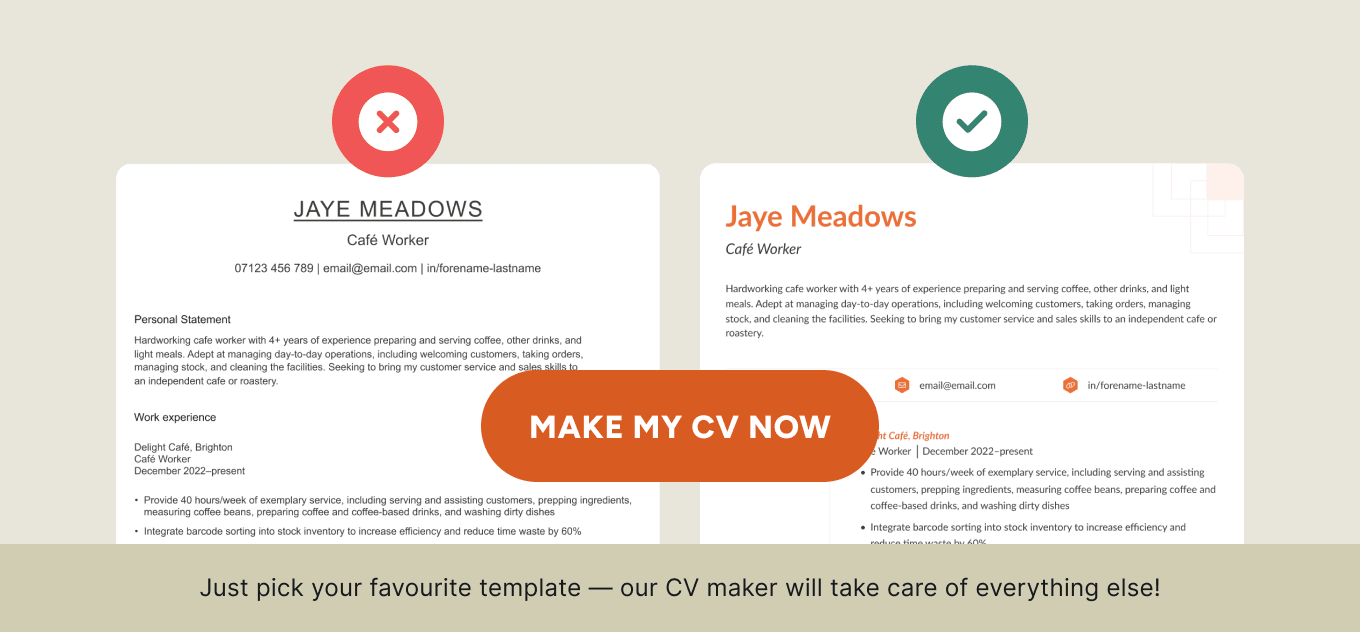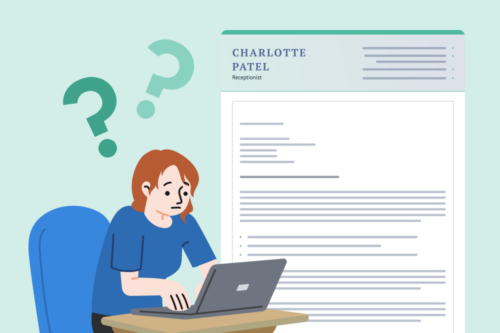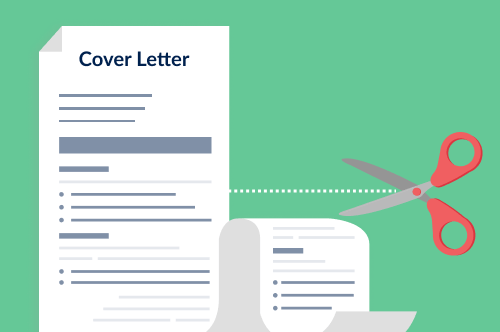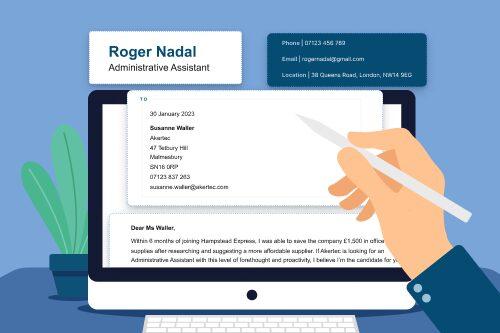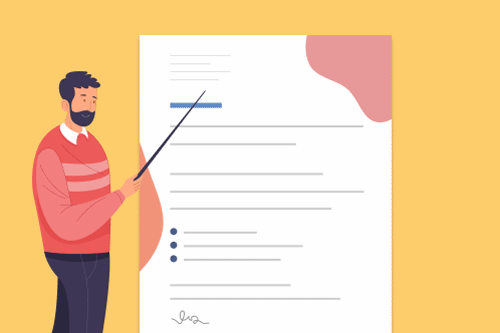Not sure how to make your cover letter?
Here are the five best cover letters of 2024 to give you some inspiration, followed by a list of the traits all great cover letters share and our advice for how to make the ideal cover letter for your situation.
1. The standard cover letter
A standard cover letter follows a common pattern, but it doesn’t have to be boring or like everybody else’s:
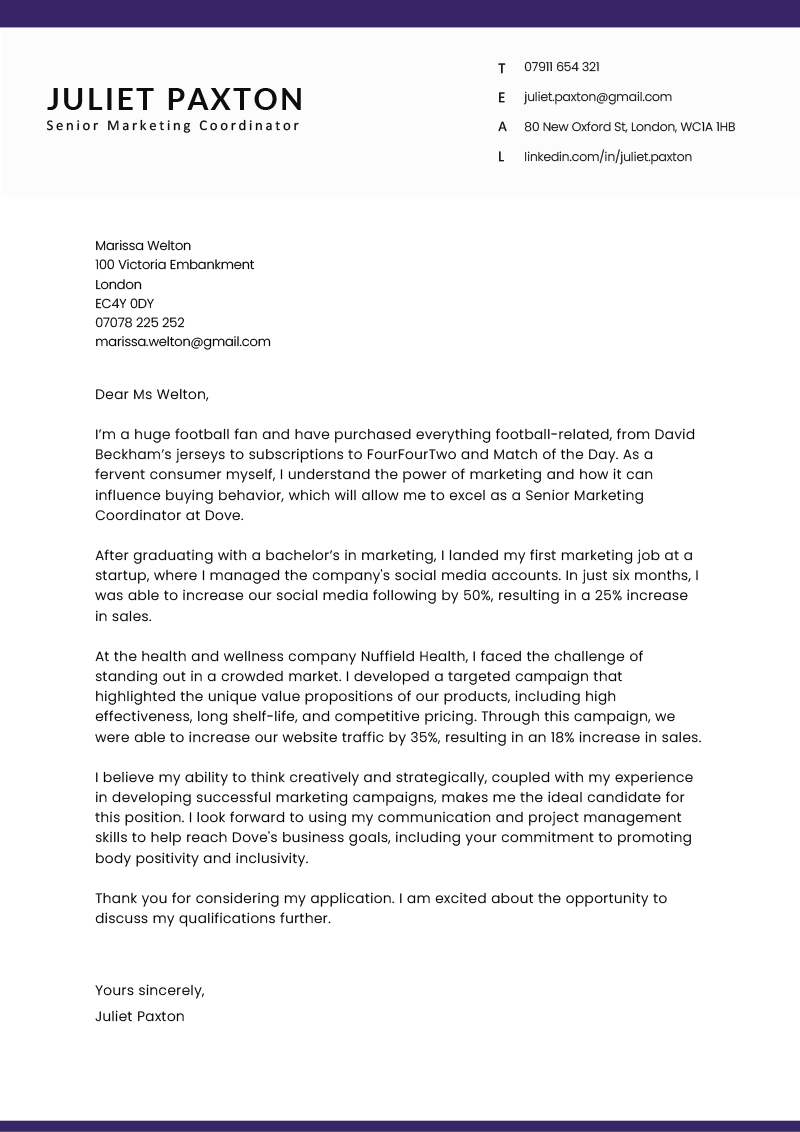
Why this is a great cover letter
A standard cover letter uses traditional cover letter formatting and may be the best cover letter type for you if you need to maintain professionalism. With this kind of cover letter, you shine through your content rather than any surprises in writing or design.
Your standard cover letter should take the hiring manager on a journey through your work experience and highlight how the things you learned along the way make you a perfect fit for the position.
2. The short cover letter
The next candidate gets directly to the point with their short cover letter:
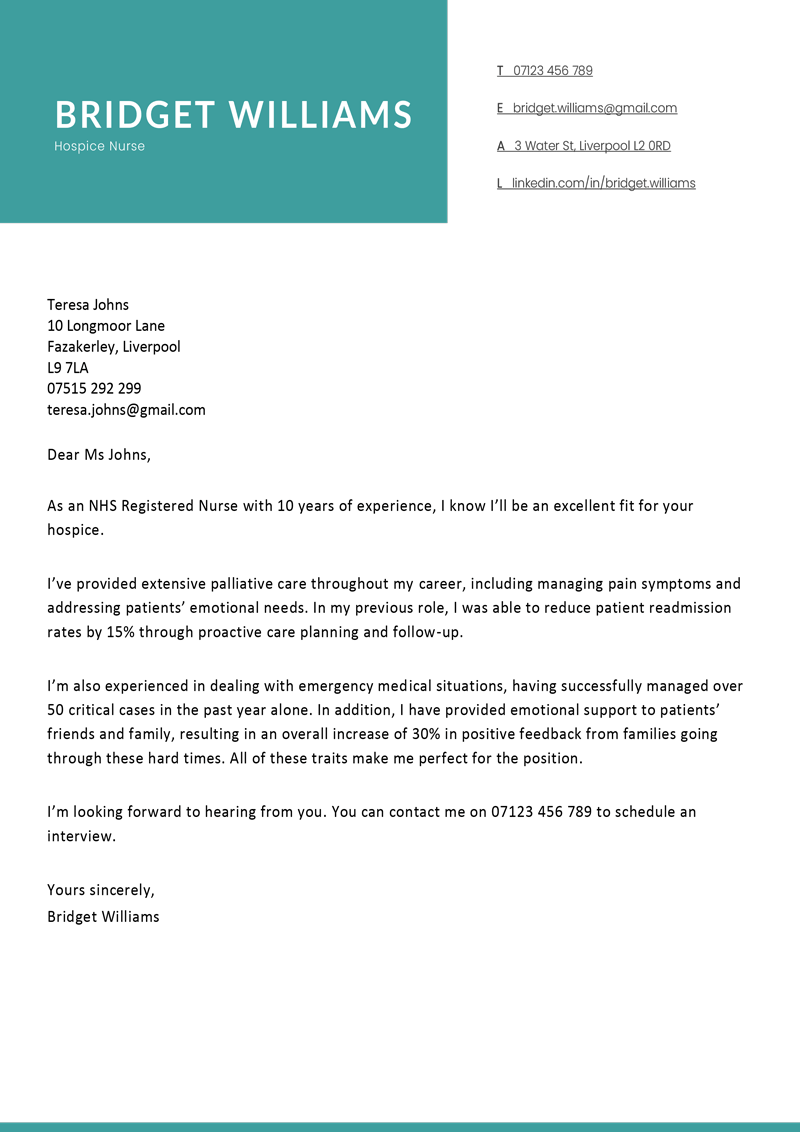
Why this is a great cover letter
While a cover letter can be up to 400 words long, a shorter one is always welcome. And despite being short, this cover letter is still full of relevant information, including the applicant’s:
- number of years of experience
- main area of expertise (palliative care and emergency medical situations)
- achievements
- bedside manner (mentioning how they’ve emotionally supported patients and family members)
3. The creative cover letter
This creative cover letter breaks with tradition, standing out visually by using the title as a friendly greeting, centring the text, and using a non-standard background image:
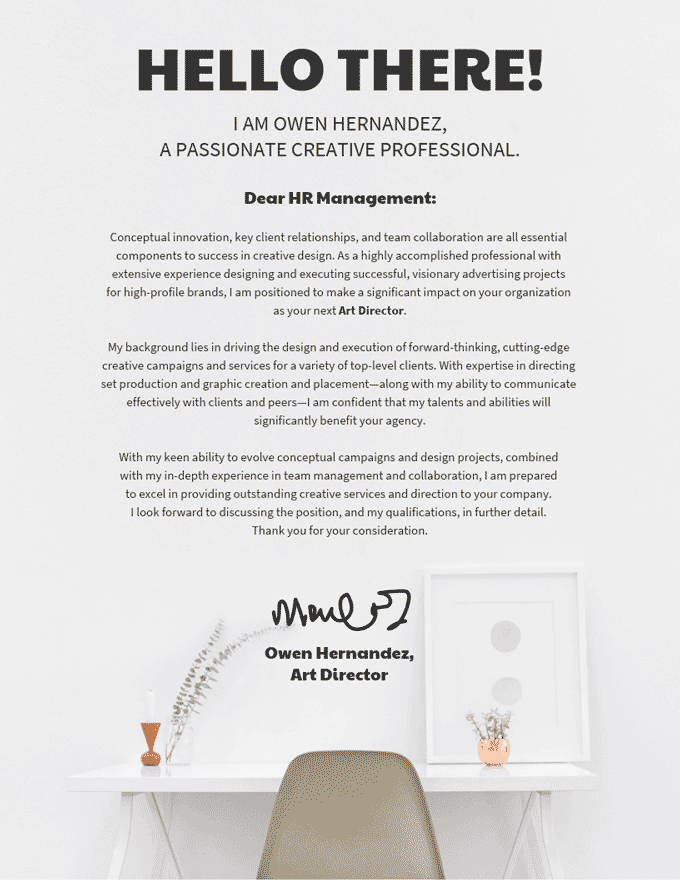
Why this is a great cover letter
This is a great cover letter because its design makes it stand out. The cover letter itself is proof of the creativity and design skills that the applicant would bring to the target role.
Despite using an unconventional design, it still has what should be in a cover letter, including a salutation, body paragraphs that mention the role the person is applying for and their qualifications, and a sign-off that thanks the employer for their consideration.
4. The entertaining cover letter
Here’s an excellent cover letter example for an IT position that immediately separates itself from other cover letters:
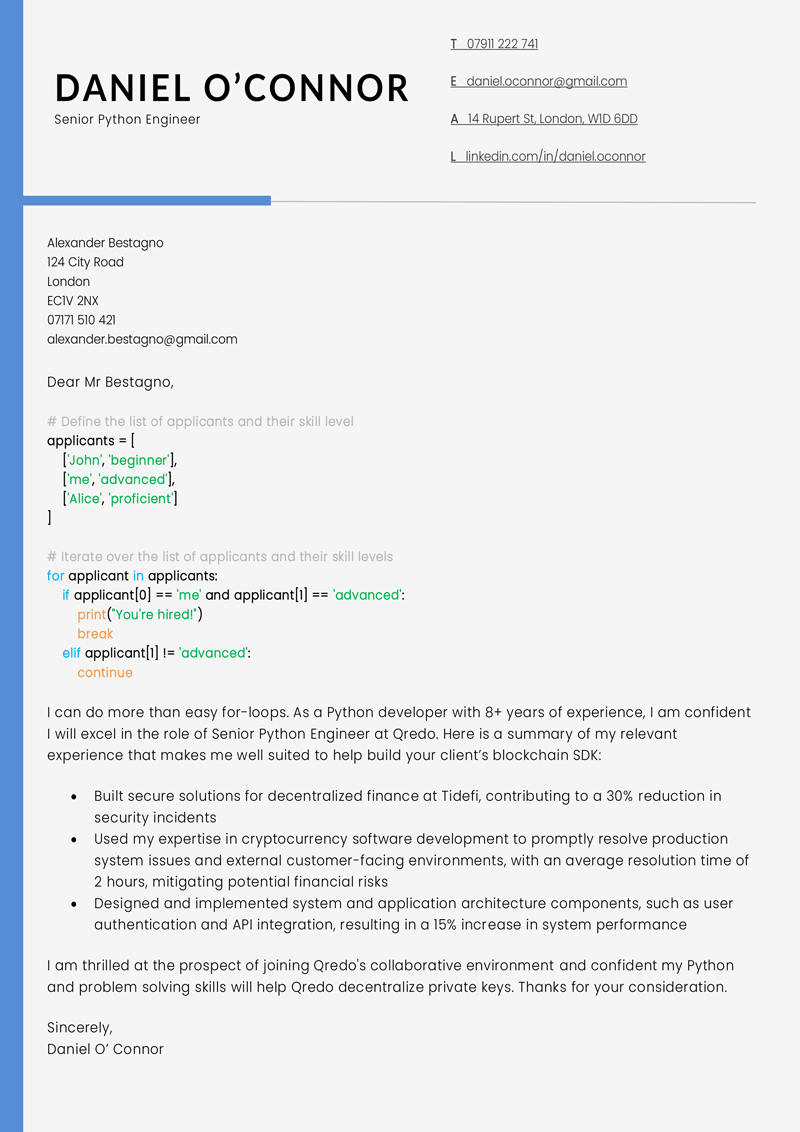
Why this is a great cover letter
This IT cover letter makes the list of best cover letters we’ve seen in 2024 because it’s clever and impactful. A short code example immediately catches the employer’s attention, even if the hiring person isn’t a programmer.
After using that cheeky attention-grabber, the applicant then explains why they’d be a great fit for the role, using numbers to quantify their experience and IT skills, and bullet points for easy reading.
To really impress employers, add numbers when you write your CV too. And if you don’t have time to write, try using a CV maker that builds your CV in minutes.
5. The skills based cover letter
A skills based cover letter rounds out our list of the best cover letters of 2024:
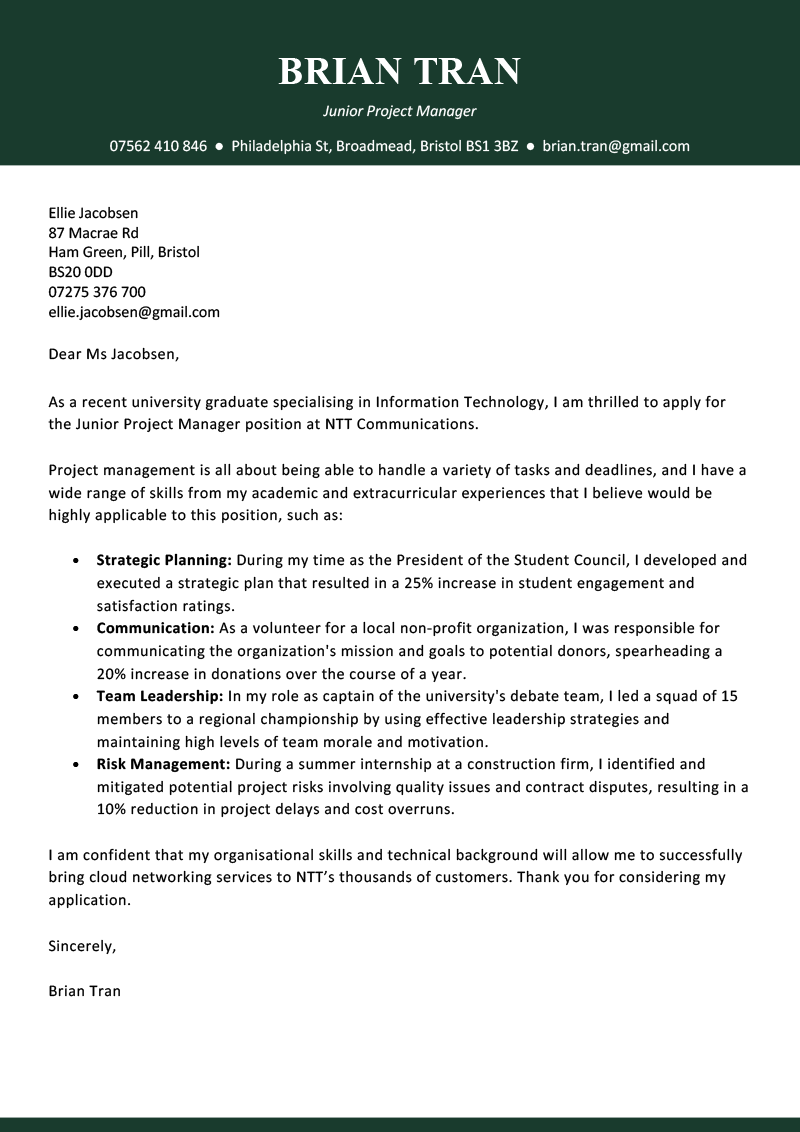
Why this is a great cover letter
This cover letter is awesome because it emphasises the applicant’s transferable skills to make up for the fact that they don’t have much experience related to the target role. As a result, this is a great cover letter example for recent graduates and career changers to follow.
Like a skills based CV, this cover letter doesn’t go chronologically through the applicant’s experience, but picks experiences from all areas of the applicant’s life that demonstrate skills relevant to the job.
This cover letter also excels because it’s customised to the job advert — showing the employer that the applicant understands what the role calls for — and supported with data.
Traits the best cover letter examples share
When you evaluate great cover letters, it’s important to note their common features and then mimic those features in your letters. Our experts read through the best cover letter examples and noticed that they:
- Get specific: So employers have a concrete idea of your skills and achievements, you should be as specific as possible in your cover letter. For example, you can use numbers (e.g., ‘improved sales by 20%’) and exact quotes (e.g., ‘my manager has called me “integral to completing projects accurately and on time”’).
- Show personality: To set yourself apart from other applicants, let your personality come through. You can show your personality via the writing, such as adding appropriate humour into your cover letter, or through a unique design (for creative professions).
- Catch the employer’s attention: The best way to make your cover letter memorable is to evoke an emotion from the reader, such as by making them laugh or leaving them impressed and inspired by your achievements.
- Stay concise: The ideal cover letter length in the UK is one page or less. Employers don’t have much time and are more likely to not read a long cover letter at all. So keep your cover letter short by picking your most impressive achievements that match the job advert and briefly describing them.
- Are customised to the position: Employers want to know you’re excited about working for their company specifically. So describe your top skills and experience that match what the company wants, mention the company name, and state what attracted you to apply.
How to write the best cover letter for your situation
Follow these three tips to write a cover letter that perfectly meets your application needs:
1. Choose one of the best cover letter examples to follow
The type of cover letter you should use depends on many factors, including your industry and career stage:
- Standard, short, and skills based cover letters are more suitable for serious industries.
- Creative and entertaining cover letters are best suited for industries in the arts.
So read the job advert carefully to get a sense of the types of cover letters your target employers expect.
This excerpt from a retail associate job advert suggests the employer would appreciate a creative or entertaining cover letter:

2. Fill in the cover letter with your personal details
Know what cover letter format you want to use, but still having trouble writing the content?
Use a cover letter builder, good cover letter examples, and ChatGPT to give you ideas and help you find the right wording for a great cover letter. Just remember to edit your cover letter so it has the characteristics of the best cover letters.
Additionally, avoid copying directly from any tool to ensure your cover letter shows your unique personality and that you’re interested enough in the position to tailor your cover letter to it.
...and personalise it for the employer too!
Addressing your cover letter to a named contact person tells the employer that you’ve taken a serious interest in the opportunity and done proper research before making your application.
Use a formal personalised greeting like ‘Dear, [Full Name],’ or ‘Dear Mr/Ms/Mx [Last Name]’. If a contact person wasn’t named in the job description, search the hiring manager’s job title online or call the company and ask.
3. Polish your cover letter
After you edit your cover letter yourself, send it to a friend to proofread or put it through a proofreading program like Grammarly or Hemingway. Your cover letter won’t be one of the best cover letters employers have seen if it has spelling or grammar mistakes — no matter how good your content is.
Frequently asked questions about the best cover letters
Want to know more about how to write the best cover letter possible? We’ve outlined more information about what makes a great cover letter below.
1. How do I make a creative cover letter?
To make a creative cover letter, add an unexpected component to the standard cover letter elements. An unexpected component could be in the design, such as using a creative cover letter template, or in the content of the cover letter. Examples of creative content in a cover letter include:
- telling a short story
- adding humour
- researching a problem the company has and explaining how you’d solve it
- including a stylistic piece of writing (e.g., a poem, a formatted definition, a short dialogue — but only if you’re sure the workplace is open to more playful cover letters)
2. Is it appropriate to use humour in my cover letter?
Yes, it is appropriate to use humour in your cover letter. The best way to add humour to your cover letter is to:
- not overdo it (one joke or pun should suffice as an attention grabber)
- stay professional (avoid crass jokes or foul language)
- keep it relevant to the target position
3. How do I write a good cover letter for a career change?
To write a good cover letter for a career change, demonstrate right away that you have the required basic knowledge to enter the field, such as:
- a relevant degree
- bootcamp or any intensive learning experience
- related volunteer experience
- industry certifications
Once you assure the employer you meet the minimum requirements for the job, stress your transferable skills, enthusiasm for the role, and willingness to learn.
Also learn how to write a career change CV that summarises your transferable skills.
